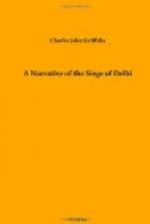When near the canal, which was shaded on each side by trees, the Major advanced to reconnoitre, and on his return, the order was given, “Guns to the front!” The Horse Artillery galloped past us, and we then heard that the enemy were in sight on the other side of the canal.
Crossing a bridge, and passing through trees and jungle, the whole force debouched on an open plain, and formed in order of battle. The first line consisted of the artillery, in the centre, flanked on each side by the cavalry—cavalry—portions of the 9th Lancers, the Carabineers, and that fine regiment, the Guide Corps. Coke’s Corps of Punjabees and my regiment formed the second line.
It was a pretty sight to see this miniature army advancing in perfect order towards the enemy. The plain extended for a mile quite open and without trees, bounded at that distance by a village, in which the insurgent guns were posted. Clouds of horsemen, apparently without any formation, hovered on each side of the village, and a large force of infantry was standing in line somewhat in advance.
Our guns came into action at a distance of about 1,000 yards from the village, and were soon answered by those of the enemy, their shot striking unpleasantly close to our line, and ricochetting over our heads. Still we advanced, hoping that the rebels would stand till we came to close quarters. At 500 yards the fire from our artillery seemed to prove too hot for them; and presently, to our infinite disgust, we saw their infantry moving off to the left, followed shortly after by the cavalry. Then their guns ceased firing, and were also quickly withdrawn.
The Carabineers and Guides were sent in pursuit, and cut up some stragglers; but the insurgents stampeded at a great pace, and succeeded in carrying off all their guns.
A few sepoys were found hiding in the village huts, and were killed by our men, the Alipore plunder was recovered, besides some ammunition and camp equipment, and, rather dissatisfied with the result of the action, we moved slowly back across the plain.
The regiment was commanded on this occasion by our senior Captain, an officer of some thirty-five years’ service. He was, without exception, the greatest oddity for a soldier that our army has ever seen. Five feet two inches in height, with an enormous head, short, hunchback body, long arms, and thin, shrivelled legs, his whole appearance reminded one of Dickens’ celebrated character Quilp, in the “Old Curiosity Shop.” Entering the service in the “good” old times, when there was no examination by a medical man, he had, through some back-door influence, obtained a commission in the army. All his service had been passed abroad, exchanging from one regiment to another, for it would have been utterly impossible for him to have retained his commission in England. Marching, he was unable to keep step with the men, and on horseback he presented the most ludicrous appearance,




